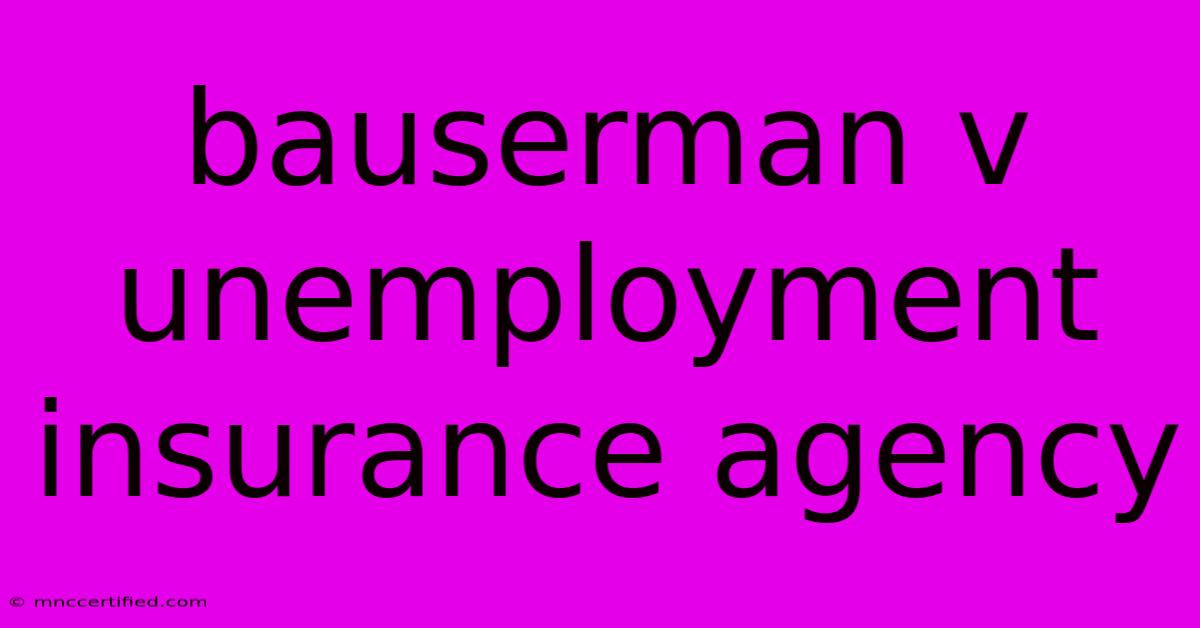Bauserman V Unemployment Insurance Agency

Table of Contents
Bauserman v. Unemployment Insurance Agency: A Landmark Case on Employer Liability
The case of Bauserman v. Unemployment Insurance Agency, decided by the Michigan Supreme Court in 1968, set a crucial precedent in determining employer liability for unemployment benefits. This case, involving a dispute over a worker's entitlement to unemployment insurance after being dismissed for misconduct, clarified the legal framework for handling such situations.
The Bauserman Case: A Summary
In this case, Bauserman, an employee of the Michigan Employment Security Commission (MESC), was fired for insubordination after refusing to follow a direct order. He subsequently filed for unemployment benefits, claiming he was unjustly terminated. However, the Unemployment Insurance Agency (UIA), which oversees unemployment benefits in Michigan, denied his claim based on his misconduct.
Bauserman appealed the decision, arguing that his refusal was justified due to a perceived safety hazard. The case eventually reached the Michigan Supreme Court, which ruled in favor of the UIA, upholding the denial of unemployment benefits.
Key Takeaways from the Bauserman Decision:
- Misconduct as a Bar to Unemployment Benefits: The Bauserman case established that misconduct, defined as willful or intentional violation of the employer's rules or disregard for the employer's interests, can be grounds for denying unemployment benefits. This principle applies even if the employee believes their actions were justified.
- Employer's Right to Enforce Rules: The court affirmed the employer's right to enforce its rules and policies, even if they seem arbitrary or unfair to the employee.
- Burden of Proof: The case also established that the burden of proof lies with the employee to demonstrate that their actions were not misconduct. This means the employee must provide sufficient evidence to prove their actions were reasonable and justified.
Bauserman's Impact on Unemployment Insurance Law:
The Bauserman decision has had a lasting impact on unemployment insurance law in Michigan and other states. This landmark case has served as a cornerstone in defining the legal framework for determining employer liability for unemployment benefits. It provides clear guidance for both employers and employees on the circumstances under which an employee may be denied benefits.
For Employers:
- The Bauserman case highlights the importance of having clear and well-defined rules and policies regarding employee conduct.
- Employers must be prepared to enforce these rules consistently and fairly.
- Documenting instances of misconduct is crucial for proving the employee's violation and supporting a denial of benefits.
For Employees:
- Understand the importance of following company rules and policies, even if they seem unreasonable.
- If an employee believes they have been unjustly terminated, they should carefully document the events leading up to the termination and seek legal advice.
- Be prepared to provide evidence to support their claim of justified actions.
Conclusion:
The Bauserman v. Unemployment Insurance Agency case remains a landmark decision in Michigan unemployment law. It continues to guide the legal framework for determining employer liability and employee entitlement to unemployment benefits. This case serves as a reminder of the importance of clear communication, consistent enforcement of rules, and proper documentation for both employers and employees. Understanding the principles established in this case can help both parties navigate the complexities of unemployment insurance claims.

Thank you for visiting our website wich cover about Bauserman V Unemployment Insurance Agency. We hope the information provided has been useful to you. Feel free to contact us if you have any questions or need further assistance. See you next time and dont miss to bookmark.
Featured Posts
-
Does Insurance Cover Arson By Someone Else
Nov 07, 2024
-
Sf Mayoral Race Breed Faces Challenges
Nov 07, 2024
-
Ny Lawmakers 4 Actions Before Trump Takes Office
Nov 07, 2024
-
Linkage Global Updates On Nasdaq Status
Nov 07, 2024
-
Vances Ruthlessness From Mockery To Power
Nov 07, 2024